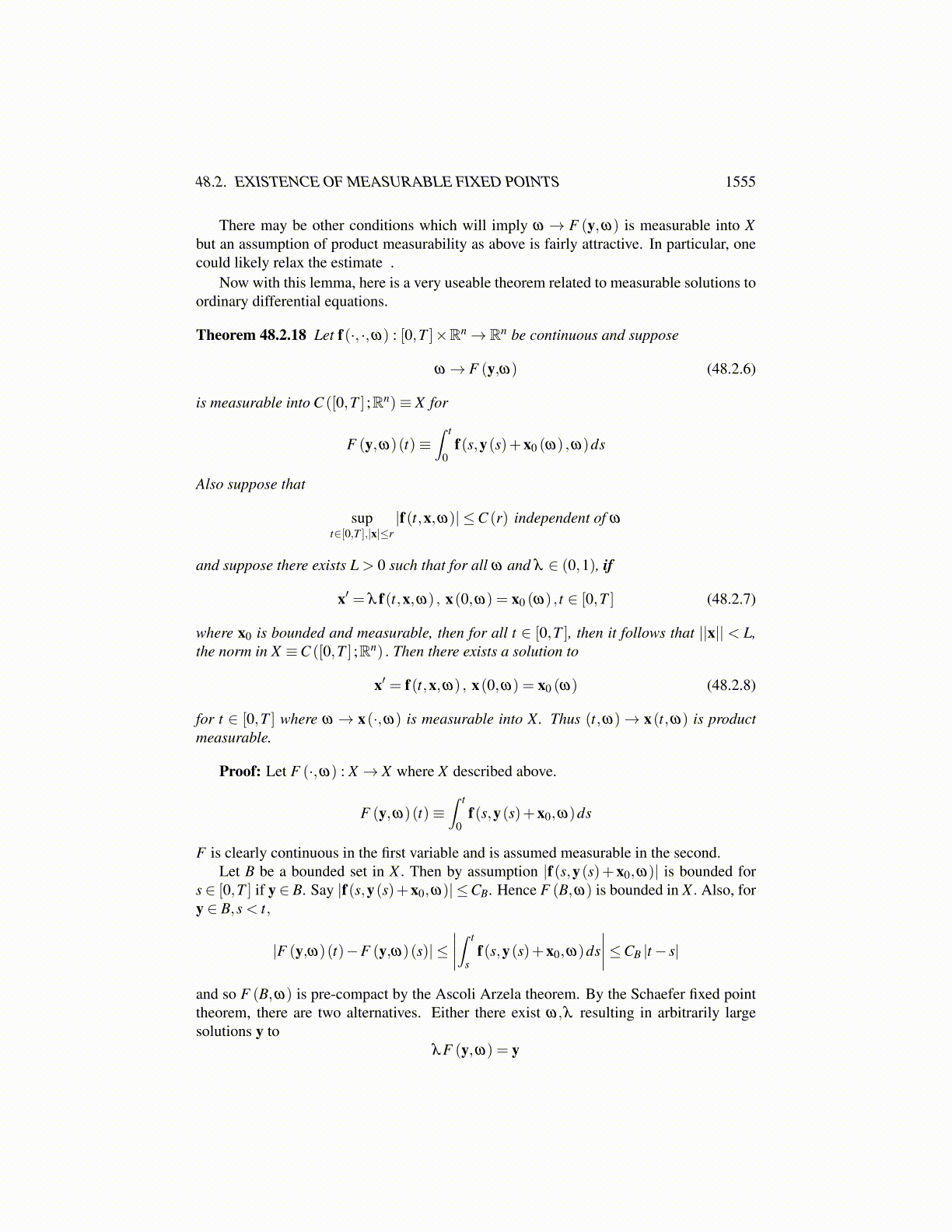
48.2. EXISTENCE OF MEASURABLE FIXED POINTS 1555
1. There is a measurable fixed point x(ω) for t f (·,ω) for all t ∈ [0,1] or
2. For every r > 0, there exists ω and t ∈ (0,1) such that if x satisfies x = t f (x,ω), then∥x∥> r .
Proof: Suppose that alternative 2 does not hold and yet alternative 1 also fails to hold.Since alternative 2 does not hold, there exists M0 such that for all ω, and for all t ∈ (0,1) ,if x = t f (x,ω) , then ∥x(ω)∥ ≤ M0. If alternative 1 fails, then there is some t with nomeasurable fixed point x(ω) for t f (·,ω) . So let M > M0. By the measurable Schauderfixed point theorem, Theorem 48.2.13, there is measurable xM (ω) such that
xM (ω) = t (rM f (xM (ω) ,ω)) , rMy = y if ∥y∥ ≤M,rMy =My∥y∥
if ∥y∥> M
Thus rM is continuous and so rM f (·,ω) is continuous and compact. We must have
∥ f (xM (ω̂) , ω̂)∥> M
for some ω̂ and rM f (xM (ω̂) ,ω) = M f (xM(ω̂),ω̂)∥ f (xM(ω̂),ω̂)∥ since if ∥ f (xM (ω) ,ω)∥ ≤ M for all ω,
thenrM f (xM (ω) ,ω) = f (xM (ω) ,ω)
and there would be a measurable fixed point for this t. But then, for this ω̂
xM (ω̂) = t (rM f (xM (ω̂) , ω̂)) = tM f (xM (ω̂) , ω̂)
∥ f (xM (ω̂) , ω̂)∥= t̂ f (xM (ω̂) , ω̂)
From the hypotheses that 2 does not hold, ∥xM (ω̂)∥ ≤ M0. Thus ∥ f (xM (ω̂) , ω̂)∥ > M.But this requires that C (M0) > M for all M which is clearly impossible. Hence there is ameasurable fixed point for t f (·,ω) for all t ∈ [0,1].
We will use this very interesting Shaefer theorem to give an easy to use criterion forshowing the existence of measurable solutions to ordinary differential equations.
Lemma 48.2.17 Let X ≡ C ([0,T ] ;Rn) and let f(·, ·,ω) : [0,T ]×Rn → Rn where ω ∈ Ω
for (Ω,F ) a measurable space and let (t,x)→ f(t,x,ω) be continuous on [0,T ]×Rn.Also suppose a uniform estimate of the form
supt∈[0,T ],|x|≤r
|f(t,x,ω)| ≤C (r) independent of ω (48.2.4)
If f is B ([0,T ]×Rn)×F measurable and ω → x0 (ω) is F measurable, then for y ∈ X ,define F (y,ω) ∈ X by
F (y,ω)(t)≡∫ t
0f(s,y(s)+x0 (ω) ,ω)ds
Thenω → F (y,ω)
is measurable into X.